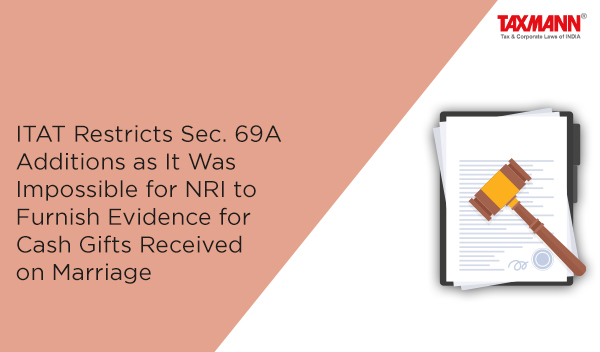ITAT Restricts Sec. 69A Additions as It Was Impossible for NRI to Furnish Evidence for Cash Gifts Received on Marriage
- Blog|News|Income Tax|
- 3 Min Read
- By Taxmann
- |
- Last Updated on 23 September, 2023

Case Details: Karthick Natarajan v. Deputy Commissioner of Income-tax, International Taxation - [2023] 154 taxmann.com 136 (Chennai-Trib.)
Judiciary and Counsel Details
-
- Mahavir Singh, Vice President & Manoj Kumar Aggarwal, Accountant Member
- T. Vasudevan, Adv. for the Appellant.
- D. Hema Bhupal, JCIT for the Respondent.
Facts of the Case
Assessee- NRI, made a cash deposit of Rs. 1 crore in his bank account during the demonetization period. On being enquired by the Assessing Officer (AO), the assessee claimed that the amount was received in connection with his marriage celebrated on 7-12-2015 and claimed the same as exempt being gifts received during marriage under the proviso to section 56(1)(vii)(c).
The AO noted that the assessee had not furnished any material evidence to substantiate that he had received the gift of Rs. 1 crore during his wedding other than the wedding invitation card to prove the genuineness of his claim. Accordingly, AO made the addition of Rs. 1 crore as unexplained money as per the provisions of section 69A.
On appeal, CIT(A) held that the assessee was an NRI, and it was nearly impossible for him to prove gifts received on the occasion of marriage. Thus, CIT(A) restricted additions to Rs. 70 lakh. The assessee filed a further appeal before the Chennai Tribunal.
ITAT Held
The Tribunal held that the assessee himself deposited cash in his bank account and tried to explain the sources through the cash gifts received during the occasion of marriage in December 2015. However, it rejected assessee’s contention that cash deposits made in the accounts can’t be treated as not income because he made such deposit during the demonetization period. The deeming provisions of section 69A are clearly applicable.
The assessee argued that a reasonable deduction on the basis of reasonable estimation should be made, but he could not produce any sort of evidence to substantiate his claim, either the names or their address or anything relating to the gift received in cash.
There was no direct evidence available from the assessee to substantiate his claim, but going through the customary system in Indian society, the observations of CIT(A) that no economic transaction can be divorced from the underlying social-cultural factors is to be agreed with. It is customary in Indian society and according to status that one receives gifts in marriage.
Hence, a further estimation was made, and Rs. 20 Lakhs was deleted and subsequently, Rs. 50 Lakhs was treated as unexplained money under section 69A.
List of Cases Reviewed
-
- Karimtharuvi Tea Estates Ltd. v. State of Kerala [1966] 60 ITR 262 (SC) (para 10.1) distinguished.
List of Cases Referred to
-
- CIT v. Smt. P.K. Noorjahan [1999] 103 Taxman 382/237 ITR 570 (SC) (para 5)
- Karimtharuvi Tea Estates Ltd. v. State of Kerala [1966] 60 ITR 262 (SC) (para 8)
- Mercantile Credit Corpn. Ltd. v. CIT [2000] 108 Taxman 210/245 ITR 245 (Mad.) (para 8)
- DCIT v. Punjab Retail (P.) Ltd. [IT Appeal No. 677 (Ind.) of 2019, dated 8-10-2021] (para 8)
- Maruthi Babu Rao Jadav v. Asstt. CIT [2021] 430 ITR 504 (Ker.) (para 9)
- Ahmedabad Mfg. and Calico Printing Co. Ltd. v. S.G. Mehta, ITO [1963] 48 ITR 154 (SC) (para 10.2)
- Bhagavathy Tea Estates Ltd. v. State of Kerala [1990] 50 Taxman 180/[1989] 179 ITR 508 (Ker.) (para 10.3).
Disclaimer: The content/information published on the website is only for general information of the user and shall not be construed as legal advice. While the Taxmann has exercised reasonable efforts to ensure the veracity of information/content published, Taxmann shall be under no liability in any manner whatsoever for incorrect information, if any.

Taxmann Publications has a dedicated in-house Research & Editorial Team. This team consists of a team of Chartered Accountants, Company Secretaries, and Lawyers. This team works under the guidance and supervision of editor-in-chief Mr Rakesh Bhargava.
The Research and Editorial Team is responsible for developing reliable and accurate content for the readers. The team follows the six-sigma approach to achieve the benchmark of zero error in its publications and research platforms. The team ensures that the following publication guidelines are thoroughly followed while developing the content:
- The statutory material is obtained only from the authorized and reliable sources
- All the latest developments in the judicial and legislative fields are covered
- Prepare the analytical write-ups on current, controversial, and important issues to help the readers to understand the concept and its implications
- Every content published by Taxmann is complete, accurate and lucid
- All evidence-based statements are supported with proper reference to Section, Circular No., Notification No. or citations
- The golden rules of grammar, style and consistency are thoroughly followed
- Font and size that’s easy to read and remain consistent across all imprint and digital publications are applied



 CA | CS | CMA
CA | CS | CMA
